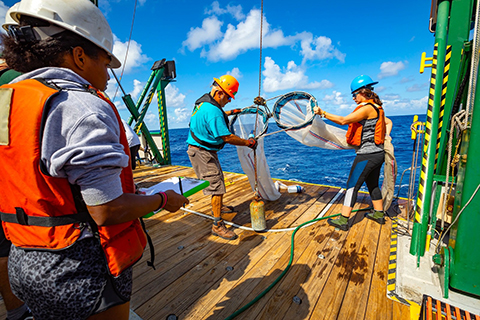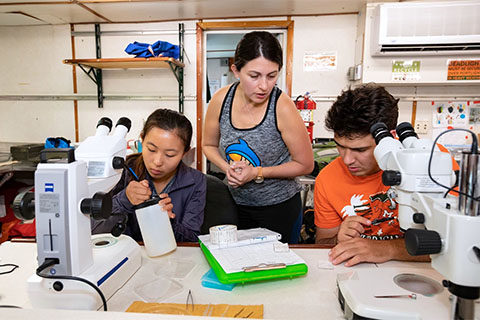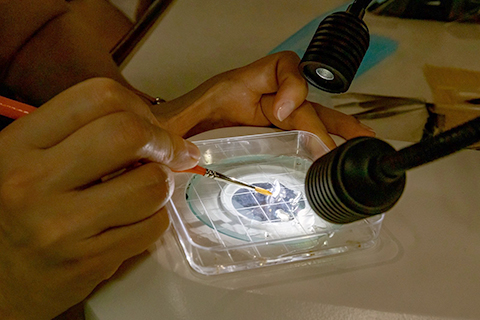Why study the Ocean?
With a surface 70% water, Planet Earth is Planet Ocean!
You may have thought about how the ocean and its liquid water are critical to life on Earth? But have you thought about how the ocean and its circulation is fundamental to Earth’s habitable climate?
In our current-day climate crisis measuring and understanding the ocean is more important than ever. So far, the ocean has absorbed over 90% of the excess heat from human-caused climate change and 30% of the excess carbon. The ocean has been mitigating the warming effect of our fossil-fueled economies! But the cost of this convenience is high. The warming ocean brings rising sea levels and is fueling more intense storms that threaten our coastal cities. The excess carbon uptake is causing ocean acidification that is disrupting the marine food web. And everywhere the heat, carbon, and nutrient fluxes in the ocean are changing, influencing regional climate, ice sheet loss, and primary productivity to name a few.
The world’s governments, through the United Nations, declared 2020-2030 The Ocean Decade and have launched an implementation plan for a Global Climate Observing System. Ocean observations are the most critical and challenging element of this observing system. We need oceanographers and ocean observations to understand and predict climate, and to mitigate and adapt to accelerating climate change.
As a graduate in ocean sciences, you will have the opportunity to contribute to the legacy of a healthy, sustainable ocean into the future. The ocean is the last great wilderness on Earth and it is under increasing pressure from climate change and exploitation. Our graduates gain fundamental science and coding skills (physics, math, chemistry, computer science) applied to the understanding of the ocean and its processes that are fit for careers across all sectors, including science, data science, marine and green technologies, start-ups, NGOs, policy-making, and governance.
What is Oceanography?
Oceanography is a multi-disciplinary geoscience, involving the application of physics, chemistry, biology, and math to understanding the ocean and its processes. Oceanography involves the application of ships, satellites, robotics, precision instrumentation, engineering, computing, data visualization, and ingenuity to measure, sample, and model some of the remotest regions on Earth. Oceanography is also collaborative, with teams of scientists, technicians, and engineers working together at sea and in the lab to collect data, analyze samples, and conduct research.
Oceanography embraces a broad set of questions about the ocean and its role in the climate system, such as: How do ocean currents circulate heat around the globe? How do tides and turbulence affect nutrients and primary productivity in the ocean? How is sea level at the coast related to marine heat waves, currents, and eddies offshore? Why are ocean frontal systems warming the fastest? How often do harmful algal blooms occur and why? How do changes in sea water chemistry and microbe activity in the ocean feedback on atmospheric levels of carbon dioxide? How does the marine food web store carbon in the deep ocean? How does circulation under ice shelves accelerate their melting?
Because the ocean is key to climate predictability across time scales from months to centuries, oceanographers also collaborate on such questions as: Will the monsoon rains over India be weaker this summer? Did the release of carbon from the deep ocean cause warming during the Cretaceous period? How much more often will sunny day flooding occur in Miami next decade?
What can you expect from a degree in Oceanography at UM?
The BSMAS in Oceanography provides a broad foundation in the basic sciences (mathematics, physics, chemistry and biology) and the ocean sciences (physical, chemical, and biological processes in the ocean) as well as elements of geological and atmospheric sciences. Students can choose to specialize in one or more of these sub-disciplines and are strongly encouraged to complete a minor or a second major in Chemistry, Physics, Biology, Geology, Meteorology, Mathematics, Computer Science, or Engineering. These disciplines provide the necessary quantitative foundation from which to study and understand how the ocean works. A double-major is highly desirable for students who want to compete for graduate school and are passionate about going onto a research career in oceanography.
The Rosenstiel School of Marine, Atmospheric and Earth Science at UM is one of only a handful of academic oceanographic institutions in the US, with over sixty faculty conducting research of local, regional, and global relevance, from red tides in Biscayne Bay to the rapid warming of the Indian Ocean. There are opportunities to interact with and learn from these world-class faculty through classes, labs, reading groups, senior projects, day trips on UM’s research vessel Walton Smith (FLOTSUM program), and the semester-long U-Galapagos program.
The ocean sciences faculty at Rosenstiel School run a number of high-tech facilities, laboratories, and instruments to conduct their research, including CSTARS for the analysis of satellite imagery; SUSTAIN for the study of hurricane-force winds at the ocean surface; cell sorting flow cytometry and mass spectrometry to identify and quantify marine microbes; numerical models to understand ocean circulation and mixing; statistical models to assimilate observations and make predictions; isotopic and radiocarbon analysis to study the ocean’s biological carbon pump; a coastal radar network that monitors the Florida Current; and an ocean technology lab with instrumentation that can be deployed for months and years to measure the variability of currents and water properties in the deep ocean.
Undergraduate students are encouraged to work with the faculty and are able to earn course credit by conducting independent research under the supervision of leading scientists in their field.






